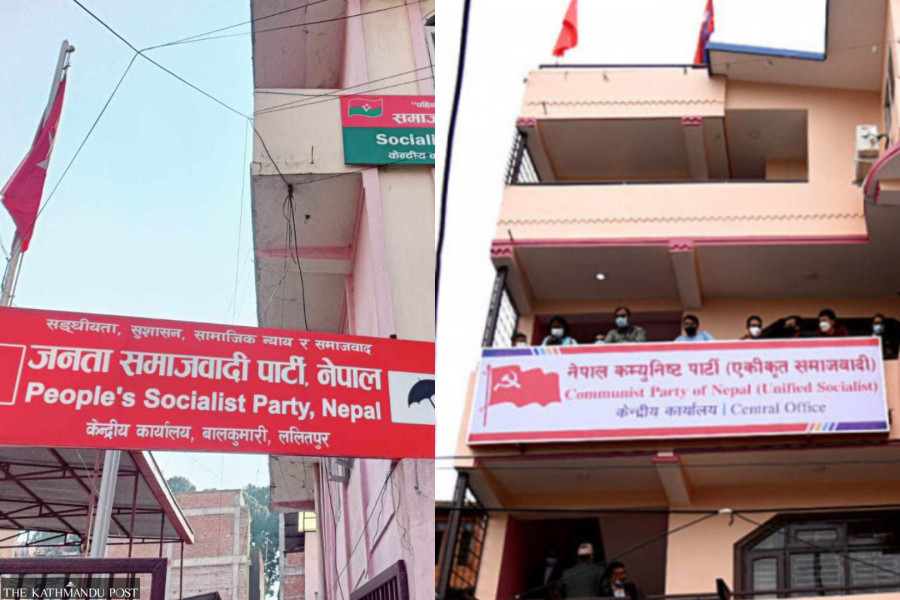Politics
Delay in filling party positions highlights decay in internal democracy
JSP-N and CPN (Unified Socialist) recently held their general conventions, but have delayed filling key positions, opting to handpick office bearers instead of holding elections.
Purushottam Poudel
The Janata Samajbadi Party Nepal (JSP-Nepal) concluded its ‘unity general convention’ on June 12, while the CPN (Unified Socialist) completed its ‘national convention’ on July 5. However, both parties have yet to complete their convention procedures.
JSP-Nepal’s ‘unity general convention’, held on June 10-12, elected Upendra Yadav as chairman. The Unified Socialist convention, held from June 30 to July 5, concluded by electing Madhav Kumar Nepal, Jhala Nath Khanal, and Ghanashyam Bhusal as chairman, senior leader, and general secretary, respectively, through consensus among the party’s top leaders.
Though JSP-Nepal announced its central members and nine-member central executive committee after a month of the convention, it is still struggling to pick office bearers.
Similarly, Unified Socialist has yet to name its 206 central committee members and 18 office bearers, according to party leaders.
Political observers and analysts say that delaying the convention process to elect central committee and committee members reflects a decline in internal democracy within political parties.
“Usually, a party’s general convention is a platform for its members, but if it turns into a rubber-stamp session, party leaders gain more control,” Keshav Dahal, a political analyst, told the Post. “When leaders want to fill party committees with their allies and confidants, it is often easier through direct appointments than through proper voting.”
Dahal added that because every party has its factions, leaders often stall the selection process to manage these groups, which is why the selection process takes time, Dahal said.
The Unified Socialist had issued a circular during its convention held in Kathmandu, instructing the selection of the remaining committee members and central committee members within 10 days of the conclusion of the convention. But even after more than two weeks, it has failed to fill the positions.
As many as 1,849 representatives from across the country had participated in the party's national convention last month. But instead of electing central committee members through a vote, it opted for a consensus model.
The party, which was established in August 2021 after a split from CPN-UML, feared that holding elections might polarise representatives and weaken the party.
The praesidium chairman of the party's National Convention, Jhala Nath Khanal, announced a 93-member central committee from the Convention hall on the same day he was elected as senior leader.
As per the statute of the party, Unified Socialist will have a 299-member central committee including 21 officers. This means the party still needs to appoint 206 out of 299 central committee members and 18 out of 21 committee members. Additionally, the party must also finalise its standing and politburo members.
Party leaders say the election process for the remaining central committee members and other positions will begin at the party meeting on July 25.
“Since the party leaders were busy compiling the information needed for selecting central committee members, the party missed the appointment deadline,” Jeevan Ram Shrestha, a party leader, told the Post. “The party has a set criteria for selecting central committee members, and we have gathered related information from every district. The process to make the appointments will begin at the party meeting on Thursday [July 25].”
The Upendra Yadav-led JSP-Nepal concluded its unity general convention on June 12, but even a month later, it has not elected party committee members.
Though the party released the names of 215 central committee members and a nine-member central executive committee on July 11, almost a month after concluding its convention, it has yet to name its office bearers.
At the unity convention held in Janakpur from June 10 to June 12, Yadav was unanimously selected as the party's central chairman and was entrusted with the responsibility of selecting officials and central members.
“Our party has a nine-member central executive committee, however, we are yet to select the office bearers,” Prakash Adhikari, a federal lawmaker from the party and a member of the nine-member central executive committee, told the Post. “It will take us a few more days to finalise the office bearers.”
Before the party decided to halt the election process, 23 candidates—17 men and six women—had filed their candidacies for the five positions of vice chairpersons; six candidates were vying for two general secretary posts, and 12 candidates—nine men and three women—had filed their candidacies for the three deputy general secretary positions.
Besides, three leaders were in the fray for the treasurer position, and 34 leaders were contesting for seven secretary positions.




 8.79°C Kathmandu
8.79°C Kathmandu














